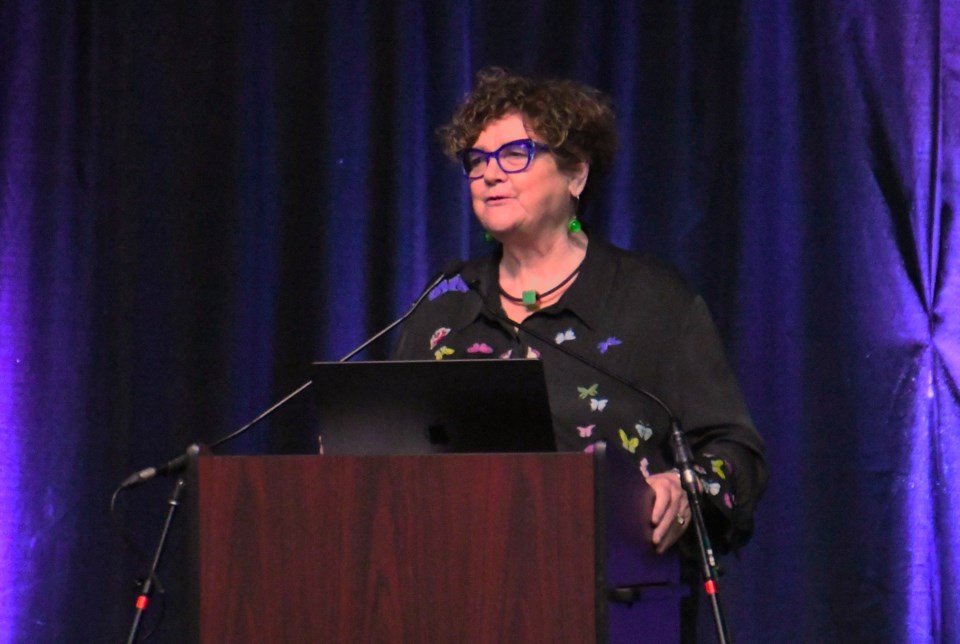MOOSE JAW — Renowned child psychiatrist Dr. Jean Clinton delivered an impassioned speech to a packed room at the International Early Learning Conference, calling for a renewed focus on relationships, emotional development and the importance of play in early childhood education this month.
The conference, held May 7 to 9 at the Temple Gardens Centre, welcomed educators, caregivers and child development experts from across the province. Clinton, a clinical professor in the department of psychiatry and behavioural neurosciences at McMaster University, delivered a message rooted in compassion, science, and Indigenous wisdom.
“The power of relationship and connection is what we’re going to talk about and hear about today,” said Clinton, whose work focuses on how early experiences shape a child’s brain development and long-term well-being.
She opened her talk by honouring Indigenous teachings, emphasizing how important it is to consider how today’s decisions affect future generations.
“Consider the interests of the next seven generations when decisions are being made,” she said. “Parenting gets passed down through generations and is modified by conditions.”
Clinton’s reference to “conditions” speaks to the complex interplay between inherited parenting practices and the broader social, economic, and cultural environments in which they unfold. From shifting societal expectations to the impacts felt by trauma, poverty, or available community supports, these contextual factors reshape how caregiving is expressed and experienced across generations.
Clinton stressed the need for adults to understand the reasons behind a child’s behaviour. “Every behaviour has a reason; it’s communication,” she explained. “First, you have to connect before you correct.”
A central theme of Clinton’s presentation was the critical role of play — a component of Saskatchewan’s provincial curriculum that she was pleased to see included.
“Play is the way that children grow. Play is the brain’s favourite way of learning,” she said. Clinton then warned against what she described as “cognitive seduction,” or the premature focus on academic skills at the expense of emotional and social development.
“When we’re focusing on school readiness, which to many people means kids can read and write, we’re not using science and the evidence that we know,” she said. “The best predictor of how a child will do in school is not whether they can read or write — it’s whether they can get along, regulate themselves, and be part of a group.”
Clinton outlined several evidence-based strategies for parents and educators, emphasizing the importance of validating emotional expression, cultivating a strong sense of belonging, and engaging regularly in reflective practice.
“Belonging is an absolute need for humans; we have a drive to belong,” she shared.
For clarity, reflective practice involves pausing to examine one’s own responses and assumptions in order to better understand and meet a child’s emotional needs. If adults act with greater self-awareness and intention, they can create a more supportive and responsive learning environment.
She also urged educators to shift their perspective from “filling the bucket” to “igniting the flame.” “You don’t learn a thing of importance if you don’t have an emotional connection to it,” she said, pointing to the powerful emotional connection behind the analogy.
Throughout her talk, Clinton shared personal stories — including anecdotes about her nine grandchildren — and drew laughter and nods of agreement from the crowd. Her message, however, was clear and urgent: children thrive when adults are emotionally present, consistent and supportive.
“What might happen if children saw our eyes light up every time we look at them?” she asked. “We need to change the narrative. Every child needs at least one adult whose eyes light up when they walk into the room.”
Clinton encouraged attendees to see themselves as co-learners and co-researchers with children.
“When you see each child as capable and brilliant, everything changes,” she said.
The International Early Learning Conference was held at the Temple Gardens Centre, located at 110 First Avenue Northeast. For more information, visit MooseJawECC.ca or reach out to Dr. Clinton on LinkedIn.




